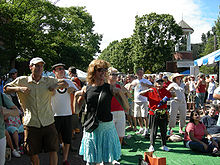Duck dance
The duck dance or bird dance is a party dance that originated on the basis of the "duck dance " melody and is only danced in connection with this melody.
History of the melody
The melody was composed in Switzerland in 1957 under the original title Chip chip by the music teacher Werner Thomas , who had tried out the tone sequence on the accordion. Thomas, who by his own account also developed the duck dance in 1963, performed the piece as a solo entertainer in pubs and festival tents. So he was discovered in 1973, the Belgian music producer Louis Julien van Rijmenant in Sunstar Park of Davos . Van Rijmenant had the notes of the melody written down, fed them into a synthesizer and added a text under the pseudonym Terry Rendall. The synthesizer version was released under the name Cash & Carry as a single with the title Tchip Tchip / Who Needs Money? published in 1973 with his Belgian record company Eurovox Music ( sub-label Cannon Records # 3035), which sold 100,000 copies. She was awarded a gold record in the Belgian television program "Binnen en buiten" on March 11, 1973 in Antwerp (6th place in the Belgian charts ) and reached 1st place in Switzerland in February 1974 for 5 weeks; In 1974, she took fourth place in the Swiss annual hit parade.
Cover versions
In total, there are at least 370 cover versions in 42 countries. In 1974 Hector Delfosse presented an accordion version as La danse des canards (French text: Guy de Paris, pseudonym of Eric Genty), which became a million seller in France . In May 1980 the Dutch band De Electronica’s released the single Radio 2000 / De Vogeltjesdans (Dance Little Bird) . On the radio, the B-side got more airplay than the A-side and earned it 6th place in the Netherlands. This was followed by an LP entitled De Vogeltjesdans . In March 1981 the Dutch instrumental version reached number one in the German charts, which it held for 8 weeks. After 51 weeks it also got gold in the charts and was also the best-selling title of 1981 in Germany. This was followed in May 1981 by a German version by Fred Sonnenschein ( Frank Zander ) alias "Fred Sonnenschein und seine Freunde" entitled Yes, if we were all angels (Hansa 103 336), which also achieved gold status and is still one of the is the best-selling German hit . He replaced the duck dance in first place and stayed there for another four weeks. Even Helga Feddersen came in October 1981 with the parody Hand me a kiss to 16th place followed Romina Power with the Italian version of Il ballo del qua qua (1981) and The tweets with the highly successful English title The Birdie Song (Birdie Dance) (October 1981, ranked 2nd in the UK). The Dansband Curt Haagers received for the Swedish version of the duck dance, which was published as Fågeldansen in 1981 , the diamond single in 1984 for the great success. The Yugoslav version was recorded by the pop group "777" from Rijeka in the summer of 1981 and released on record in the spring of 1982.
Walter Wippersberg's film Das Fest des Huhnes (1992) thematized the strange identification with the totem animal . In 2007 Pigloo hit the charts in France and German-speaking countries with a cover version entitled Le ragga des pingouins or German penguin rap .
All versions have been sold more than 40 million times worldwide. For composer Thomas, the song was “like winning the lottery” in terms of royalties . The duck dance made its debut as an Oktoberfest dance in Tulsa, Oklahoma.
dance
Werner Thomas invented dance to animate his audience during his accordion performances. He himself owned 130 ducks and 25 geese and was inspired by them: The first dance figure shows the beak of a goose, followed by the flapping of the wings of a duck. The gait of the ducks should be symbolized with the knees pressed together. Finally, the hands are clapped four times to scare away the animals. In the English-speaking world, the duck dance is known as The Chicken Dance .
literature
- Claudia Jeschke, Gabi Vettermann: Dance research - history & methods: Dance research between action, documentation and institution . In: Musicologica Austriaca . Volumes 21-22. Emil Katzbichler, Munich 2002, ISBN 3-90027064-3 , p. 213.
Web links
- Further information and audio sample
- Bird's Dance in the UK charts 80 (English)
- Interview with Werner Thomas, inventor of the duck dance
Individual evidence
- ↑ a b Ententanz , Neue Zürcher Zeitung of November 21, 2005.
- ↑ Arnold Rypens: TCHIP TCHIP ( Memento of the original from February 16, 2015 in the Internet Archive ) Info: The archive link was inserted automatically and has not yet been checked. Please check the original and archive link according to the instructions and then remove this notice. on The Originals
- ↑ Steven J. Rolfes, Cincinnati Landmarks , 2012, p. 127.
- ↑ migrosmagazin.ch: Werner Thomas dances with the ducks
- ↑ 3sat web series Oldschool , episode: Werner Thomas, 2018



